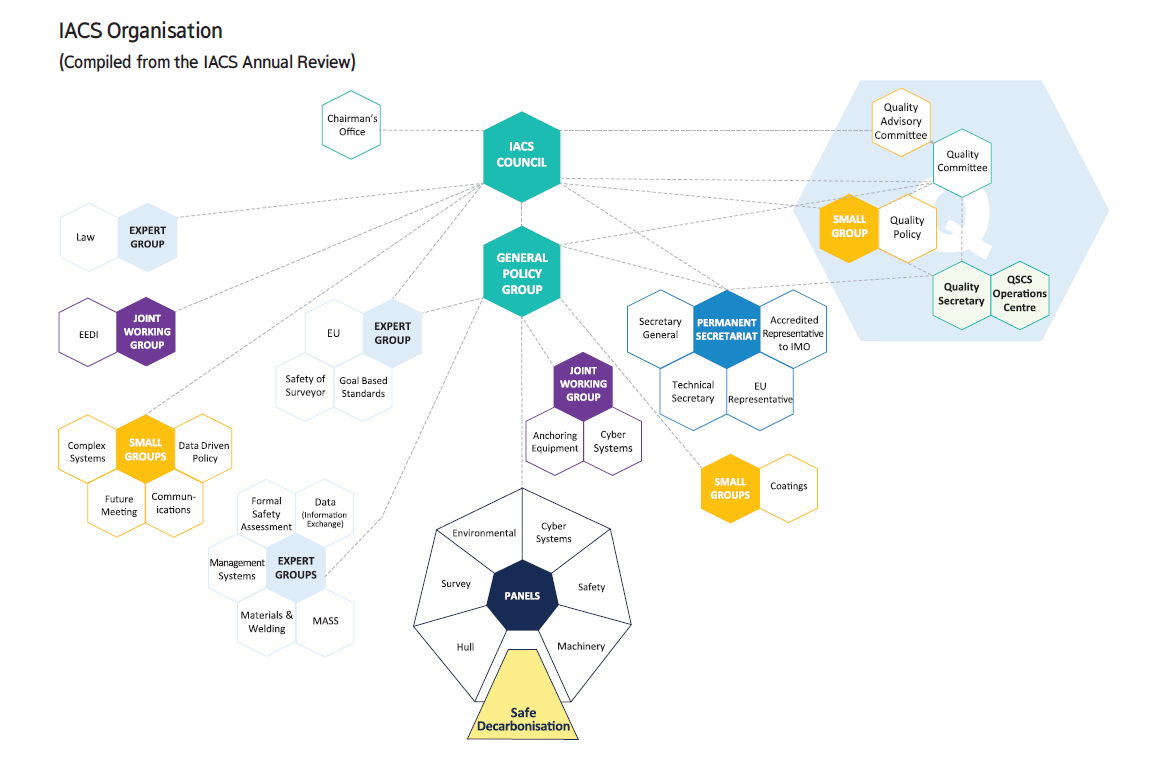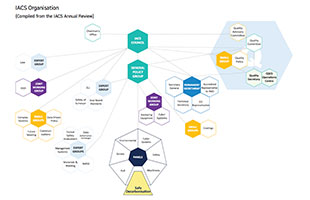Regulatory Updates
KR Decarbonization Magazine
VOL.01 | WINTER 2022
IACS established a new Panel working for safe decarbonisation to support the implementation of new fuels and technologies
The IACS Council, the highest governing body of the association, approved the establishment of a new ‘Safe Decarbonisation Panel’ (SDP) at its 85th session meeting held in June 2022.
These are the efforts taken by IACS for effective action, recognizing that the ambitious targets of decarbonisation must be progressed quickly and safely in collaboration with key stakeholders. IACS Panels are permanent working groups to discuss technical matters. The formation of the SDP demonstrates IACS' clear determination to support the industry by setting a long-term goal.
The SDP is composed of experts with the necessary knowledge and experience in decarbonisation, such as new fuels and new technologies, ship machinery, structure, safety, and environment.
While there is still a lot of technical uncertainty in relation to alternative fuels, the new Panel plans to form four Project Teams to quickly provide common technical requirements related to new fuels to lead research on candidate fuels and technologies. The Project Teams will examine the possibility of developing appropriate IACS common requirements for ships using ammonia, hydrogen, carbon capture and storage and batteries as fuel, respectively. Additionally, the Panel will also evaluate current work streams at IMO on methyl/ethyl alcohols with a view to undertaking further work as appropriate. The Safe Decarbonisation Panel aims to have the first results by the end of 2023 and will begin work as soon as the project teams are established.

IMO, GHG Reduction Initial Strategic Objective Upgrading and Accelerating Discussion on Introduction of Mid to Long-Term Reduction Measures

© IMO (www.flickr.com/photos/imo-un)
At the 78th Marine Environment Protection Committee (MEPC) meeting, the main topics discussed were the revision of the IMO GHG initial strategy to include raising reduction of the GHG target from international shipping for by 2050 and the introduction of mid-/long-term measures to achieve the reduction target. These selected measures for further development are expected to be completed by 2023. The MEPC also made a decision to approve a Unified Interpretation of the use of biofuel blends and to establish a correspondence group (CG) for the development of LCA guidelines.
The main topics that discussed were as follows:
1) Revision of the Initial IMO GHG Strategy and Level of ambition for 2050
- A thorough impact assessment on developing countries, particularly Small Island Developing Countries and Least Developed Countries, was discussed, along with revisions to the initial strategy, such as strengthening the level of motivation and a new introduction of any additional checkpoints for 2040.
- It was decided to continue the discussion through the 13th ISWG-GHG meeting on how to maintain efforts to eradicate GHG emissions in international shipping along with more specific suggestions.
2) Development of mid/long-term measures to reduce GHG
- Attention was drawn to the results of the 13th ISWG-GHG meeting on the proposed measures. As the second stage of the work plan, the proposed measures will be evaluated based on feasibility, effectiveness and impacts on states. For further development, discussions will be held to select mid to long-term measures.
3) Approval of Unified interpretation on Bio-fuel Blends
- MEPC 78 approved MEPC.1/Circ.795/Rev.6 containing unified interpretations to regulation 18.3 of MARPOL Annex VI. Accordingly, marine diesel engines that use less than 30% biofuel blended are permitted to use the fuel without onboard NOx verification procedures.
4) LCA Guidelines Developments
- Matters needing further discussion, such as setting basic emission factor values and developing certification system standards, were discussed, and a correspondence group (CG) was established for further development. The final report will be submitted when the 80th MEPC is held.
5) Onboard CO₂ Capture (CO₂ removal)
- MEPC 78 considered a proposal suggesting options to reflect CO₂ emission reduction by onboard CO₂ capture system by amending the current EEDI and EEXI calculation formulas. Interested member states and organizations are invited to submit more information and concrete proposals to a future session for further consideration.
